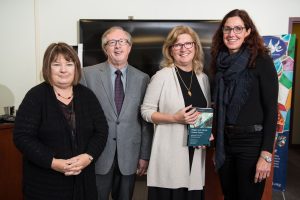






Rob Blanchard Photo UNB
For over thirty years, Barb and I worked together in some capacity. And the four of us, pictured here, worked collaboratively for over 15 years. As a RAVE team, we wrote and published articles and books together, organized conferences and professional gatherings, and presented webinars and talks, both in person and online.
We all loved working with Barb: she was conscientious, industrious, fair-minded, and generous with praise. She was also a lot of fun: whether we were eating at a restaurant, debriefing in a meeting on upcoming responsibilities, or savoring a few minutes after a job well done, she would have a humorous tale to share, often from her past, that made an ordinary moment quite extra-ordinary.
Barb loved to eat well and laugh a lot. She loved to shop, to bake and to share. But most of all, she longed to enrich the lives of those with whom, and for whom, she worked. She was a researcher devoted to understanding the impact of domestic violence and her scholarship was by nature a cooperative venture.
In the University of New Brunswick announcement of her October 11th passing, the President, Dr. Paul J. Mazerolle, wrote that “Friends, coworkers and family members will remember Barbara as an exemplary colleague with a teaching style that was lively, innovative and engaging.” Throughout her career with our RAVE Project, Barbara put her whole heart into whatever she was doing.
On Saturday, November 21st, 2020, there was a time of remembrance to celebrate the life of Dr. Barbara Fisher-Townsend. Together with her husband, David Townsend, a small group of us gathered in-person at my home in Fredericton, joined by a much larger group on-line, to celebrate Barb’s life.
Steve shared that Barb was a woman of hope. In his words: Many people are hopeful, but Barb’s use of the word hope had a deeper meaning than that. When I first met Barb in the old RAVE office at UNB when Barb was a post doc, she pointed out to me the word HOPE on one of the shelves and emphasized that for her, that was what RAVE was about. She was a researcher and a writer and a teacher and an academic, but for Barb it was more than an academic exercise. She had hope that she would make a difference. When she interviewed victims, when she interviewed perpetrators, when she wrote, and when she taught, she was seeking to instill hope. Many people have hope for themselves; Barb had hope for others. I think that was a reason why Barb found meaning in her work with women of faith-because in their faith she saw reason to encourage hope.
Hope in the future played an important role in her own life, as she wrote in the preface to our 2015 Oxford book, Men Who Batter. She completed her PhD in Sociology well into her 50s, motivated to excel, in part, by some of those challenges she had faced when she was much younger. Not only was hope a concept she had studied, but Barb knew its impact on her personal life.
In her reflections on the impact of Barb, Cathy writes: Barb’s example as a life-long learner, scholar, mother and friend inspired me to join the Religion and Violence Research Team as a graduate student and become a sociologist. Family and friends have been quick to share that Barb’s enthusiasm for life, including her work life, and her big heart are amongst her most endearing qualities.
Barb’s pleasing manner, her strength in the face of tremendous obstacles, her generous spirit, her great stories, her laugh, her relentless interest in others, and her desire to help those impacted by domestic violence—women, men and children—overcome all of the challenges they faced, will live on in our minds forever.
Nancy Nason-Clark, November 24, 2020